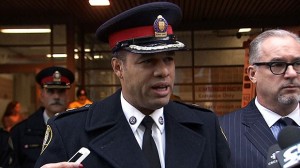
Sometimes controversial Deputy Chief Peter Sloly quit the Toronto Police Service yesterday.
Toronto Police Services Board (TPSB) issued a press release captioned “Toronto Police Services Board Announces Resignation of Deputy Chief Peter Sloly.”
His resignation is effective yesterday, Feb. 10, ending 27 years of distinguished service to the City of Toronto and its residents.
During a community meeting at City Hall, Sloly, revealed that during those 27 years, racial profiling and carding was the hardest thing he has ever confronted – he was almost moved to tears.
Sloly, who was in charge of Operational Support Command which included the Toronto Police College, has elected to move on to explore unspecified new career opportunities.
He leaves with a severance package, the details of which were not released. As deputy chief, he earned in excess of $240,000 per year, plus benefits.
TPSB Chair Andy Pringle said, “Peter Sloly leaves the service as a highly respected leader who has been recognized for his excellence within the broader international policing community and celebrated by the public for his dedication to community policing.”
Sloly, in thanking the board for its support, stated that he will look back on his career with the Toronto Police Service with pride and satisfaction, while at the same time anticipating with enthusiasm the new opportunity that lies before him.
Sloly was passed over for Toronto chief last year in favour of Mark Saunders. Both men have Caribbean heritage.
Recently, Sloly shook up the force, the board and angered the police union when he said publicly that blowing up the current policing model is the only way to contain the $1 billion-plus police budget.
Sloly stressed that “Until policing stops being focused and driven on that reactive enforcement model, it will continue to be exponentially costly.”
At a public forum, he said, “I’ve never seen policing at this low a point in terms of public trust and legitimacy. I feel there’s a crisis in the offing, not just here but right across North America.”
Sloly also dared to say what few police leaders will admit publicly: that a thoroughly modernized police service could operate with fewer officers without compromising public safety by embracing technology. For that, he earned scathing criticism from the Toronto Police Association leadership.
Saunders commented that Sloly should have come to him first with his criticisms of the police budget.


